Batman: The Dark Knight Rises part 8
In Act I of The Dark Knight Rises, Bruce’s goal is “to hide.” In Act II it became “to emerge.” Act III his goal seems to be “to lose.” The act of emerging, even though that emergence was in defense of his beloved Gotham (he didn’t know Bane was robbing him personally at the stock exchange) has left him bereft. Alfred, his father-figure, is gone, and even the rain can’t keep from pouring down upon him as he pauses to take stock (sorry) of his losses. At this low point (not to be confused with the low point, which is still to come) here comes Miranda Tate, to whom Bruce has given Wayne Enterprises (“I’ll take care of your parents’ legacy,” mwah ha ha), to pull Bruce together.
Miranda here is promoted to Second Rachel, who lost her life because of Bruce’s decision to become Batman. Rachel, who was a version of Daytime Batman to begin with, is now flipped to be Bruce’s savior. That is, Rachel corresponds to Batman as a crime-fighter, Miranda corresponds to Bruce as a financial savior. (Don’t forget, the first time Bruce met Miranda was at a charity event, and here she is again, bailing out the broken billionaire. That is the narrative function of the charity ball, to help frame Miranda as someone who naturally helps, a true believer to balance Bane’s true believer.)
Bruce, in his moment of great weakness (although worse is to come) falls into Miranda’s embrace and accepts her as Second Rachel. (Bruce’s desire to re-kindle his relationship with Rachel, repeating the past through Miranda, ties him to Jay Gatsby, speaking of wealthy men who are not as they seem.) His delusion is so great that his detective skills utterly fail him — in a world where every business dealing has its dark agenda, Bruce believes Miranda Tate must be exactly as she appears to be. (We will come to see that Miranda, far from being Second Rachel, is really Second Daggett — or worse.) Tellingly, when Bruce goes in for the kiss, the lights go out. Bruce doesn’t say “The lights went out” or “The electricity’s gone” but “The power’s been shut off.” As Bob Dylan said, “When you think that you’ve lost everything, you find out you can always lose a little more.”
Having consummated his relationship with good-Samaritan Miranda, Bruce becomes Batman again to venture to the other side of the tracks to meet anti-Miranda (and anti-Bruce) Selina. Miranda has helped Bruce out of a jam, now Bruce, in his alter ego, helps Selina — or at least offers to. (He says he has her “clean slate,” but he’s kept it to himself to keep it out of “the wrong hands.” Batman, it’s been demonstrated, is, when pushed to the limits of his concept, a zero-tolerance fascist, and his relationship to Bruce Wayne makes that tendency doubly troubling. Bruce Wayne has kept limitless clean energy to himself to keep it from falling into the wrong hands, and the underlying assumption (which connects the “clean slate” to “Hockey Pads” in The Dark Knight) is that “the rich know better.” No stumbling around for society under aristocratic rule, the society will do what the wealthy instruct them to do, or, as Charles Foster Kane put it, “People will think what I tell them to.”
Bruce accepting Miranda’s help and then extending help to Selina both prove to be disastrous. Selina, who doesn’t believe in the “clean slate” any longer (Fantine!), takes Batman straight to Bane, who is prepared to fight. Bane is a true believer, but Selina is a pragmatist, something relatively rare in the Batman universe. A pragmatist, of course, is someone who doesn’t have the luxury of convictions, which is why Bruce and Bane are both more formidable — Bane has his rage, which gives him the strength to carry out an apocalypse, and Bruce has his wealth, which gives him the spare time to follow his dream of beating up crime. (That’s why there are so few working-class superheroes: who has time?)
Bane broke Bruce financially, and now he breaks Batman physically. Batman labels Bane terrorist who “is so crazy other terrorists won’t work with him,” which is, incidentally, the kind of character spy thrillers used to use to avoid angering real terrorists. Bane counters by labeling himself not the lunatic fringe of a movement but its central pillar, whether he is truly the return of the League of Shadows or merely a madman who has chosen to fly under the League’s colors.
Having broken Bruce financially and physically, Bane then hits him where it really hurts: he steals his toys. “Your precious armory,” he gloats, as he blows open the ceiling to reveal Wayne Enterprises’ R&D warehouse above them. Bane’s rage has given him a clarity of vision: to seize power, you have to have access to the tools of those who actually have it. In Bruce’s case, that means money and superior technology, both of which he’s been hoarding for years, to “keep it out of the wrong hands.”
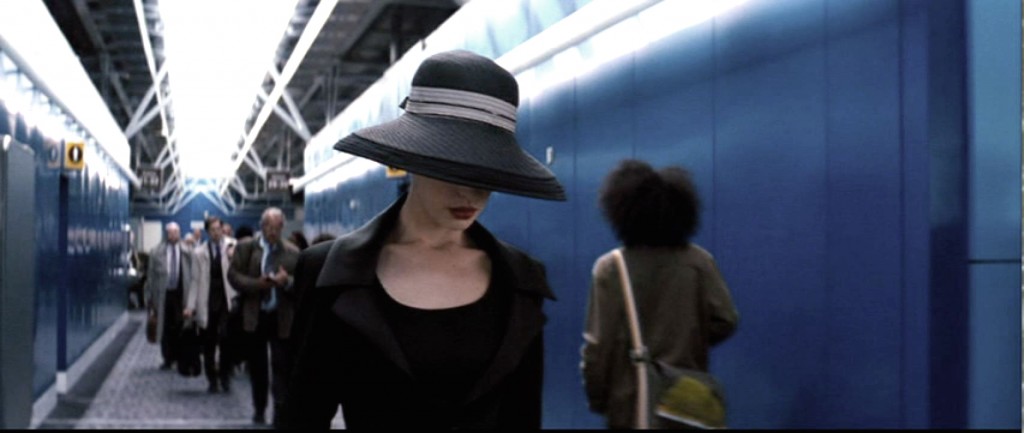
Meanwhile, Blake goes over to Wayne Manor (amazing how they got the just-rebuilt mansion to look so old so fast), presumably looking for Bruce. Not finding him, he takes his place for a moment, turns into Daytime Batman and tracks down Selina (through the time-honored detective method of “seeing her on the street”) as she attempts to flee the country. Batman needs a suit, armor, gadgets and a flying machine to snag Selina, but all Blake needs is a detective badge. Daytime Batman and anti-Batman, although at odds, unite with the knowledge that Batman is Bruce.
On the other side of the world, meanwhile, Bruce finds that he has fallen into yet another hole in the ground, completing his Act III goal, which, now that I think about it, is not “to lose,” but “to fall.” Batman Begins was all about falling and getting up again, and Bane’s pit is his personal version of the cave that Bruce fell into when he was a child. Bruce dealt with his fear of the cave by adopting its darkness and marrying it to his power, while Bane never knew anything else, but both men chose to define themselves by that cave, that darkness. The only differences is their stations in life: Bruce had all the daylight in the world available to him but chose to stay in his cave, while Bane had no choice. That is the crucial, cruel awakening for Bruce in Rises, that he (as Alfred explains to him) could have left the cave behind at any time and still affected all the change in the world as Bruce Wayne, whereas most of the world (I almost said 99%) doesn’t have that choice.
Bane lets Bruce in on his master plan (at least he made sure to cripple the superhero before he started monologuing): he will give the people of Gotham hope before he destroys the city. The use of the word “hope,” plus the “coming storm” rhetoric, has led some to believe that Rises is some sort of Republican manifesto, that Bane is the true spirit of Obama, a madman using “hope” as an illusion while he destroys the country, and that the Occupy movement is merely a soft version of the League of Shadows. These are the same people who tied themselves into knots worrying that The Dark Knight advocated torture and were worried it would make everyone vote for McCain. (Or hoped for it, as the case may be.) But Rises has no cogent political thrust, it merely uses the vocabulary of recent political discourse to its own purposes, as buzzwords perhaps, to get the audience thinking.
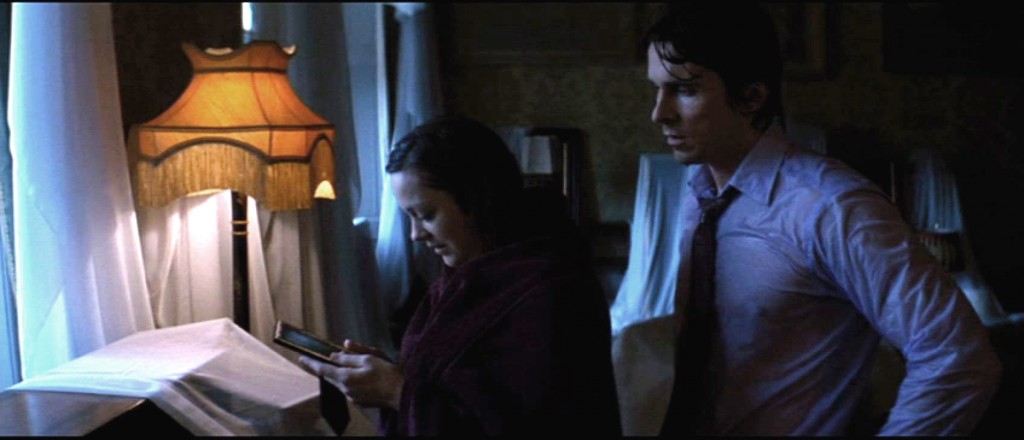
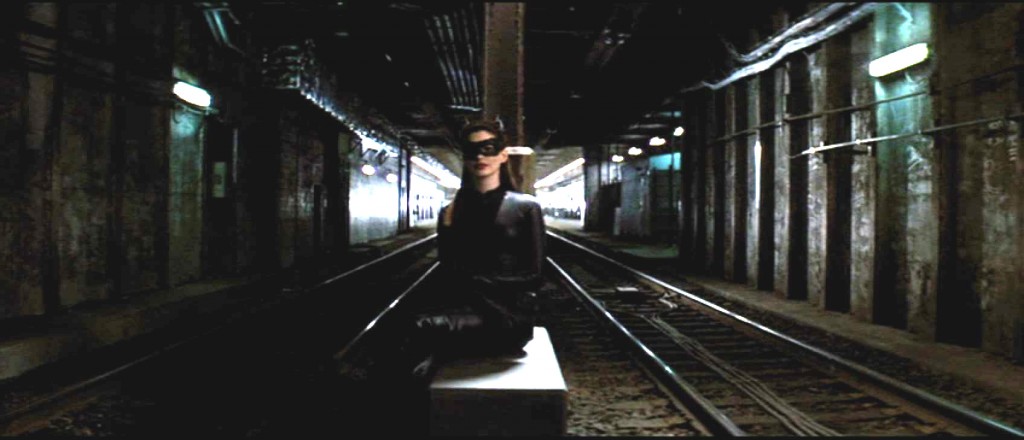
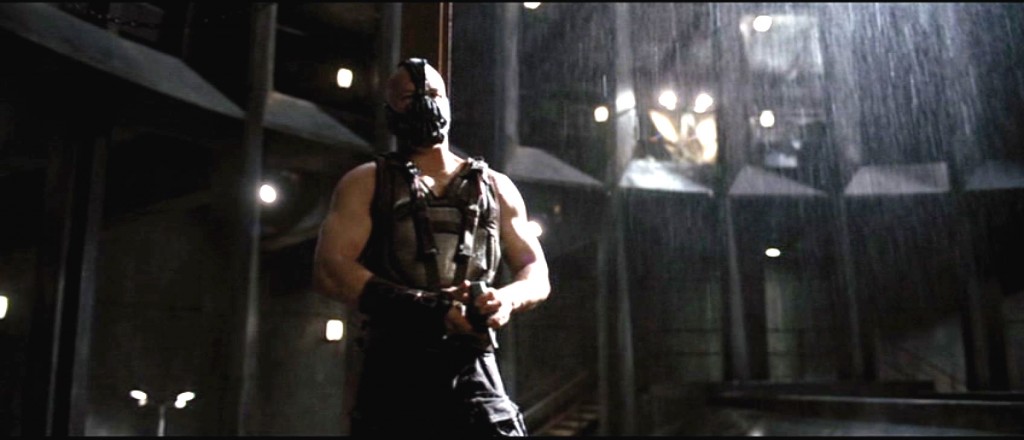
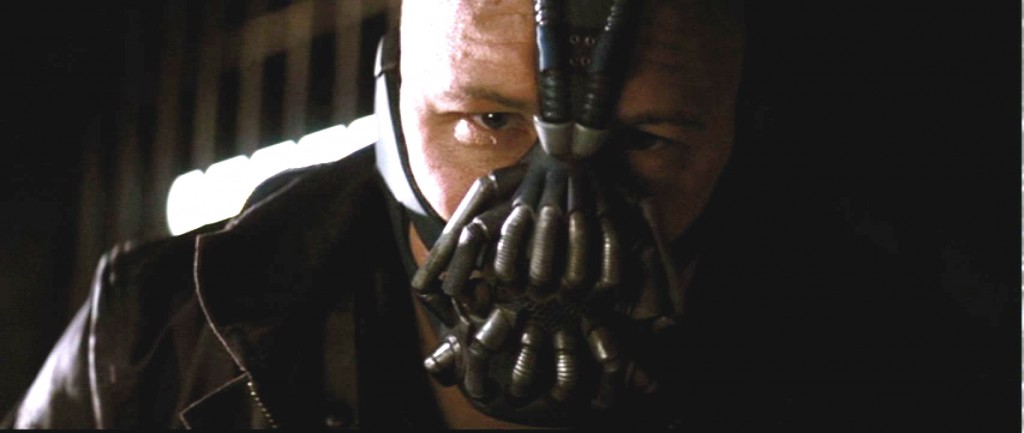
I’m curious to know… what did you think of the Batman versus Bane fight as it happens in the movie? For me, it was very tough to watch – not just because it brings our hero to his ultimate low point (he is now literally broken, both mentally and physically, and thus cannot continue his mission), but also because, on some level, I think he deserved it. DKR Bruce Wayne is so sure of himself, so positive he is still at the height of his powers despite his debilitating self-imposed eight-year exile, that he basically sets himself up to fall/fail.
I kept wondering how Bane kept from hurting himself. He punches a lot.
Thanks to the mask Bane didn’t feel a thing…thus he could push himself further as well as get into Batman’s own head by taking his best shots.
Personally, I thought of both the Empire Strikes Back when Luke takes on Vader, and that moment in most video games, like Mega Man, when the door shuts behind you and becomes a matter of life or death.
Strangely, that fight created all sorts of parallels for me between DKR and “Rocky III,” with Bane as the Clubber Lang bruiser who pretty much taunts Batman into facing him unprepared and dethrones him in humiliating fashion — forcing the hero at his lowest point to find his essence and rebuild from there.
I’d heard that before, although no one seemed to bring that up when the original KNIGHTFALL comics were released. All that’s missing is Burgess Meredith.
As the Penguin.
I have no doubt that if you put Bane into Revolutionary France, he’d be talking about liberté, égalité, fraternité. He strikes me as the kind of person who will leverage whatever the current rhetoric may be in order to sucker people into cooperating with his true agenda. Which, yes, one kind of viewer may read as a coded statement on Obama and Occupy themselves — while the opposite kind of viewer will view his words as an opportunistic perversion that speaks to the strength of Obama’s/Occupy’s message. (An ironic one, given that his name is homophonic with “Bain.” Coincidence, but an entertaining one.)
Seilna and Blake: I like that scene a lot, as I like a number of scenes throughout, because they build connections between the other characters. Too often the secondaries only speak to the hero, never to each other. And it fits the message, of course; ultimately that network is necessary.
I totally agree with Marie that Bane is willing to say whatever he can to cloak his motives, somewhat like Loki in Avengers.
But even with recognizing that, I’m a little uncomfortable with a movie that seems to say that the fascist rich guy is right and the populist is wrong. I don’t even like the sub-argument here that the populist Bane is really a fascist, keeping the power of the bomb all to himself, because it seems to collapse fascism and populism as the same thing. I’d love to see a real populist pop up here, someone whose interest in the people is honest and unalloyed with dreams of power.
Which is Selina Kyla, in some ways. I want to see her politics in action more in this movie.
Also, in 1989, when Tim Burton’s Batman came out, did we talk about it as allegory for the ’88 election? (I’d guess it would go like: Bush as Batman and Robert Wuhl’s character as Dukakis.)
Lastly, have you, Todd or Marie, read Alfred Bester’s The Stars My Destination? To me, that’s a fascinating counter-example to the fascist undertones of Batman-style superheroics.
Benjamin, spot on about Selina. I think that involving her more, or wrapping her more tightly into the narrative, would have left a more favorable impression on me regarding message.
I was left cold by this movie, but still fascinated. The surface (propaganda) level message to me (I know that diving deeper explains this away) seemed to imply a rich person’s nightmare. The working class I didn’t feel were represented well, and seemed to join in on the looting. The scene later with Selina holding a picture of a “poor, blonde rich family” in a looted house seemed to confirm a weird negative opinion of the 99% and not of released criminals. I felt like the only working class character that’s not a cop is Alfred, and all Alfred wants is for the rich guy to get what he wants.
But Selina disrupts that. Maybe she’s a working class person reacting to laws that are so restrictive that she’s a criminal no matter what she does, so she might as well be a cat burglar.
Some of the poor people joined in. A lot, like Foley’s family and the orphan later, apparently just wanted to keep their heads down.
Batman’s always been a kind of inherently fascist character. Rorschach in Watchmen is Moore’s take on what a person like that would realistically be like, and he’s got a point.
By the end of this movie, there’s a more populist streak to what Batman’s doing . . . but the populace in this instance is largely comprised of police, which doesn’t exactly solve the problem. 😛 I agree that Selina Kyle is the counterpoint, and more with her could have added a layer of complexity to the political landscape of the film.
I am interested in your ideas and wish to subscribe to your newsletter.
And I definitely agree with you and Emmar that DKR offers particular views of the people and not general enough views. I mean, that last mass-fight is police vs. criminals, which leaves what sort of position for the rest of us?
(Although I might be more interested in these sorts of images because my never-finished dissertation was going to be on crowd representations in American literature.)
The “real populist” of the story is Jim Gordon, but he’s kept so busy with the police his views on the people don’t really register.
I have no memory of any political discourse surrounding the release of Tim Burton’s Batman. It was so fresh and new (to the movie audience) that Batman would be something other than campy that that’s pretty much all anyone talked about.
I haven’t read The Stars My Destination, but it sounds awesome.
Bester in general is very worth reading.
“Not finding him, he takes his place for a moment, turns into Daytime Batman and tracks down Selina (through the time-honored detective method of “seeing her on the street”)…”
Ha! Although to be fair to Blake, the last time he *saw* Bruce Wayne was when we he was “dropping him off in Old Town” (actually sort of surprised they didn’t have Selina be from the Narrows, which was the slum of all slums in Batman Begins), so it makes sense that with no leads when Bruce has disappeared, Blake would go back there and scope out the neighborhood.
I didn’t realize until about the third or fourth viewing of the film that Blake is the police officer Selina runs into when she’s fleeing the bar earlier in the movie; explains why he’d immediately call in that he has a “lead on the congressman’s kidnapping.”
Blake has a lot of uninflected purpose in the plot. I found a number of scenes where he’s just kind of “there,” but the script doesn’t point to it.